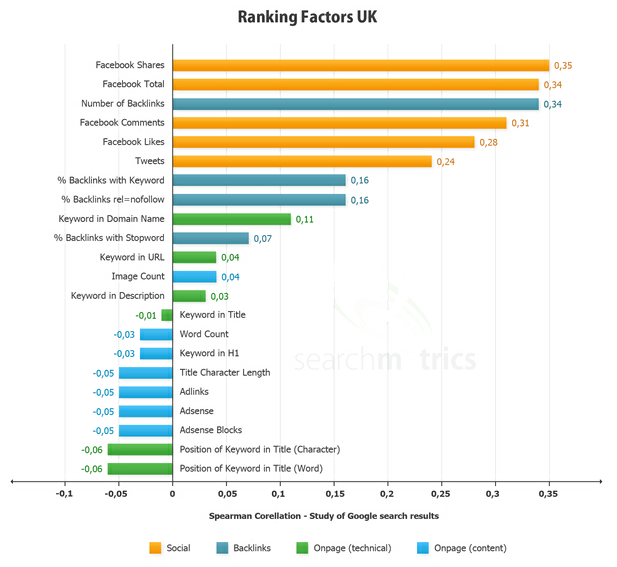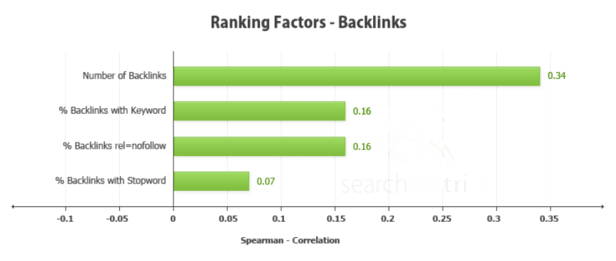 In Google’s post-Panda/Penguin search algorithm, social shares are now more important than keywords. This is one of the takeaways from a comprehensive study of UK Google ranking factors by search analytics firm Searchmetrics.
In Google’s post-Panda/Penguin search algorithm, social shares are now more important than keywords. This is one of the takeaways from a comprehensive study of UK Google ranking factors by search analytics firm Searchmetrics.
The study was based on a data-set of 10,000 selected top-keywords, 300,000 websites and millions of links, shares and tweets collected in February and March of 2012. Searchmetrics aggregated billions of data points looking for the answer to one basic the question: “Which factors are relevant for a good ranking in Google search results?”
In part, the study found that social signals from Facebook, Twitter and Google+ now correlate very strongly with high rankings in Google’s index, much higher than keywords. In fact, 5 of the 6 top ranking factors were social (good-ol’ backlinks were the only non-social ranking factor).
This chart sums up the data:

OTHER KEY POINTS
Advertising may be Harmful
Earlier in the year, Google announced it would be penalizing sites displaying too many ads at the top of the page, and the new study implies that this is true for even Google’s ad products. The study found that AdSense and Adblocks both had a negative effect on Google SERP.
Backlinks are Still Important
The number of backlinks is still the most powerful factor, although link quality is still relevant. Google seems to be is favoring a more natural link structure over perfectly keyword-optimized links.
Big Brands Get a Free Pass
It seems that pages associated with strong brands needn’t be as concerned with title tags, headings etc. According Searchmetrics, “this group operates under different rules.”
Keywords: Domains Still Good, Title & H1 Less So
Domain names with keywords strongly correlate to higher search rankings, much more so than keywords in the rest of the URL. However, keywords in the Title and the H1 tag are now weighted completed differently in Google results, and now have little impact on ranking. From this, Searchmetrics concluded that “to end up in the top positions you do not need a keyword in the title or in the H1 headline.”
Google+ Rocks, but Not Enough Data
The study found that Google+ has a correlation of 0.37 with search rankings, which would make it the factor with the strongest correlation. However, Searchmetrics CTO and founder Marcus Tober said this statistic needs to be treated with caution: “we have not included this figure in the overview because we consider it to be too unreliable. This is because Google+ does not currently have enough users and the possibility of a +1 leading directly to changes in SERPs follows accordingly, since pages receive +1s in the order that they would already be placed without them. When Google+ has values that are stronger and more independent from SERPs, these values will also be included in the overview.”¹
Looking at my own Google+ account, I could’ve told him that.
The study did go on to note that because Google is trying to make Google+ an important player, SEOs would be wise to keep an eye on it’s progression.
MARKETING TAKEAWAY
The SearchMetrics study ends with the CYA assertion that correlation does not necessarily equate to causation: “questions like ‘does a site receive social signals because it ranks well or does it rank well because it receives social signals?’ are absolutely valid and cannot be answered unequivocally with the current data.”
Caveats aside, it seems clear that social media is having a more powerful impact on Google search. This fact should not surprise when one considers Google’s Herculean efforts to breathe life into its Google+ social site (it must be galling to the Googleplex gang to know that the most important ranking factor on their own search engine is Facebook).
Given the relevance of social media generally, and social shares specifically, on search rankings, your brand would do well to focus on developing quality web-based content that is distributed throughout relevant social channels.
Aside from boosting social shares, disseminating rich content will attract still-valuable backlinks to your site. Finally, whether your business is B2B or B2C, you may want to spend some time developing a strategy to increase Facebook social shares.
Just don’t tell Google – they might get jealous.
¹ Econsultancy, “Social Shares Mean High Search Rankings” Stats”
Ranking Factor graphs courtsey of Search Metrics

